Up in smoke: Is the vape shop boom about to end?
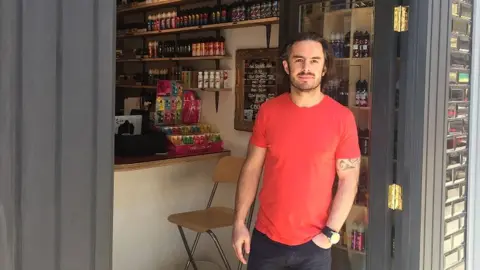 BBC
BBCIn 2015, when James Restarick opened his first shop in Kent selling kits for vaping, his friends were surprised.
"They thought I was mad. I didn't actually tell anyone for seven months that I had opened a shop."
Having previously been a partner in a bar and restaurant business he enjoyed his new lifestyle.
"I used to do double shifts, I would be in there day and night - now I have a life."
And as a former heavy smoker, Mr Restarick enjoyed helping others give up cigarettes.
Business went well, Solvape was profitable within eight months, but the market was about to get a lot more difficult.
I met Mr Restarick in his second shop, on Whitecross Street in central London, which he opened in April 2017.
He chose the street because there was no competition, but within months there were two other vape shops.
"I opened it up... bang on the time that everyone wanted to open a store," he says.
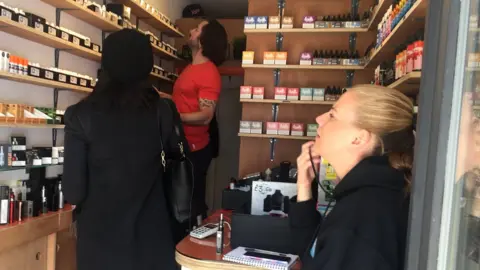
He feels the market is "saturated" with people hoping to strike it rich.
"All of a sudden there's a new market where, with a little bit of money, you can have a go."
As well as increased competition, vape shop owners have had to cope with new regulations. The Tobacco Products Directive (TPD) came into force in May 2016. It was designed to protect consumers yet had unforeseen consequences.
Wholesalers discounted products that were no longer allowed under the new rules, in particular larger bottles of vaping liquid.
Shops took advantage of this temporary drop in wholesale costs and slashed their own prices, which fell by as much as 40% last summer, upsetting the economics of running a vaping shop.
Since then stores have found it difficult to put prices back up.
"It's ridiculous," says Mr Restarick. Tighter profit margins will cause many shops to close, he thinks.
"Everyone's opening up thinking it's a quick buck. There's only so many people vaping. A lot of shops will be shutting."

Vaping and smoking
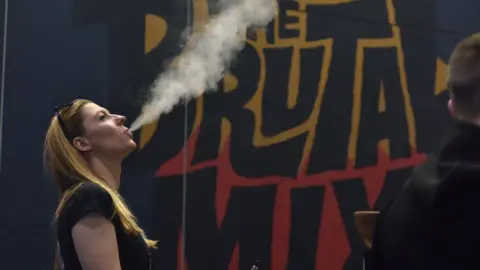 Getty Images
Getty ImagesA traditional cigarette burns tobacco, producing tar and carbon monoxide that cause health problems.
E-cigarettes have a small chamber which is filled with a water-based liquid. That is then heated producing a vapour, hence vaping.
That vapour does not contain tar or carbon monoxide, but does include additives and flavourings.
Users can choose whether to use a liquid that contains nicotine.
An independent review of the latest evidence, published by Public Health England earlier this year, suggests at least 20,000 people a year are quitting with the help of e-cigarettes.

Data about vape shops is patchy as the industry is relatively new.
In 2017, 381 tobacconists opened in the UK, the vast majority of which would have been vape shops, says the Local Data Company.
The UK Vaping Industry Association (UKVIA) says there are around 2,000 UK vaping outlets.
This number is likely to grow "exponentially", mirroring the growth of coffee and mobile phone shops, it adds.
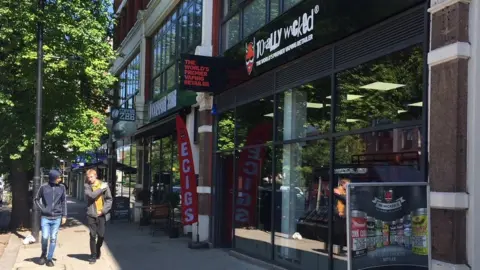
But Fraser Cropper is not quite so bullish.
He is managing director of Totally Wicked, the UK's biggest vaping shop chain with 140 stores.
His company opened its first High Street store in 2011, but Mr Cropper says the big expansion came after 2013, when new products came on to the market.
"There's definitely a change from undersupply to oversupply," he says.
"I think we're in a period of rationalisation now," he says, and a lot of stores need investment otherwise they will be forced to close.
Customers want "normal retail service, rather than something which is too peculiar or arcane".
"A vaping store where there are plumes of smoke rolling out of the door doesn't appeal to the mass vaper."
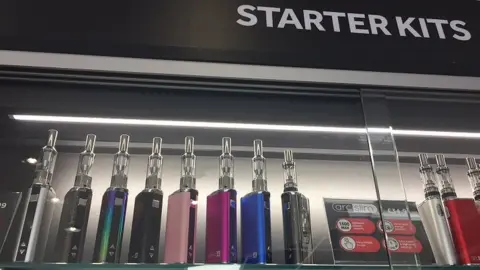
The days when a plucky entrepreneur could quickly and cheaply get into an expanding market are over.
A "decent" High Street store costs £30,000-50,000, Mr Cropper estimates.
Big firms can also experiment with other ways of reaching customers. Totally Wicked has recently launched a subscription service, which Mr Cropper says has been "relatively successful".
But like the smaller firms, Mr Cropper has issues with the regulation of his business.
In particular he would like restrictions on advertising to be lifted.
"We can't talk about the relative risks of our product compared to tobacco, which is bizarre."
He would also like to sell bigger bottles of vaping liquid, the limit is currently 10ml and bigger bottles would mean better discounts for customers, he says.
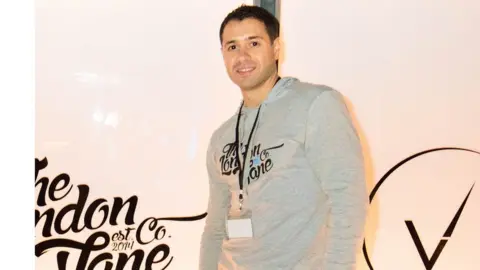 TAZ PHOTOGRAPHY
TAZ PHOTOGRAPHY"You've got to take it really carefully in the current climate," says Anthony Mixides, the founder of the London Vape Company.
He opened his first store in 2014 and expanded quickly, owning four shops in North London by the end of 2015, but now says he is waiting to "see how the market pans out and then make that decision on growth."
He attributes his caution to a general downturn on the High Street and rising costs, particularly business rates. He's also keeping an eye on the big tobacco companies, who are launching products that heat tobacco, rather than burn it, which they claim is less damaging to health.
But Mr Mixides thinks there will always be a place for vaping stores - as long as they provide good service. In his experience shoppers like to browse and try products and has found that a loyalty card scheme has kept customers coming back.
Back at Solvape in east London, James Restarick says he will be one of the industry's survivors. He has refurbished his shop in Kent and sharpened his prices.
"I've now done deals with my wholesalers. I've now got the best price I've ever had and I've undercut every shop."
